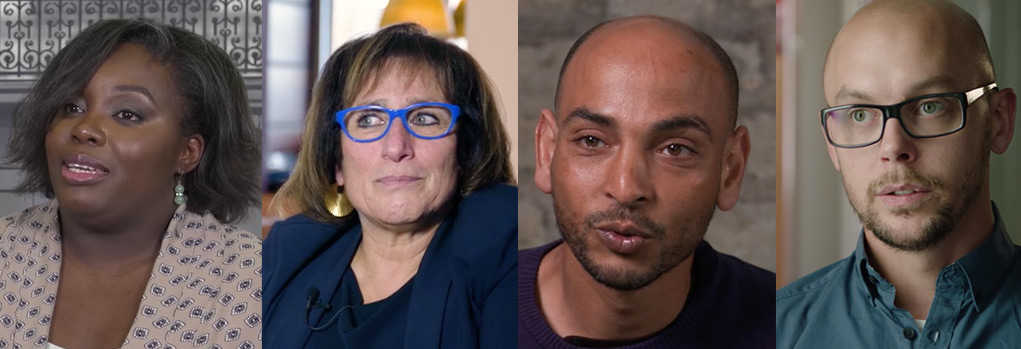UNESCO to use new USC Shoah Foundation testimonies in initiative to counter rising antisemitism


Chouna Lomponda, the communications director of the Jewish Museum of Belgium; Viviane Teitelbaum, member of the Brussels Parliament in Belgium; Abdelghani Merah, brother of Mohammed Merah, a terrorist who in 2012 killed seven people in France in a series of gun attacks; Peter Sundin, a former neo-Nazi who is now a Holocaust studies lecturer. They are among dozens who were interviewed for USC Shoah Foundation's new Countering Antisemitism collection.
USC Shoah Foundation's new collection of testimonies gathered in response to rising antisemitism will be featured in an upcoming UNESCO initiative to provide concrete pathways for policymakers around the world to address the crisis.
UNESCO’s push is part of a wider effort to address rising incidents of antisemitic events, which in recent years have ranged from online hate speech to physical violence. Central to the effort is the idea that antisemitism – like all forms of intolerance and discrimination – contributes to a toxic environment that can give rise to violent extremism and poses a threat to all of civil society.
On Monday, June 4, UNESCO and the Organization for Security and Co-operation in Europe (OSCE) will launch a guide they co-authored on the theme of “addressing antisemitism through education, guidelines for policymakers.”
UNESCO will kick off its campaign at its headquarters in Paris on June 4 with an event that will open with a reel of USC Shoah Foundation’s testimonies from the Countering Antisemitism Through Testimony collection. The opener will be followed by remarks from UNESCO Director General Audrey Azoulay as well as a roundtable discussion – titled “What education policies can prevent anti-Semitism?”
USC Shoah Foundation’s Countering Antisemitism program began in 2015 in response to spreading antisemitic violence. The Institute enlisted trained crews in Belgium, Denmark, France, Hungary, Sweden, the United Kingdom and the United States to record dozens of video testimonies from witnesses of violent events, victims of antisemitism, and people whose beliefs and attitudes related to antisemitism have evolved over time.
The Countering Antisemitism Through Testimony collection also includes supplemental interviews with scholars, as well as survivors of the Holocaust, taken 20 years after their initial testimony in USC Shoah Foundation’s Visual History Archive to reflect on the nature of antisemitism then and now.
Interviewees in this collection include a former neo-Nazi who is now a Holocaust studies lecturer, a renowned Nazi hunter who has helped to prosecute war criminals, and the communications director of a Jewish museum in Belgium where a gunman opened fire and killed four people in 2014.
USC Shoah Foundation will cross-promote UNESCO’s initiative with its own distribution of content on social media, including clips and resources via its Focal Points – Antisemitism webpage.
The institute will also point to its robust set of educational resources that explore antisemitism. These resources – all found on IWitness, the Institute’s online education platform – currently draw from testimonies of survivors of the Holocaust and other genocides as well as testimonies from the Countering Antisemitism Through Testimony collection.
The IWitness resources include:
- The Power of Conversation - Challenging Extremism (grades 10-12)
- Antisemitism and the Bystander Effect (grades 7-12)
- The Power of Propaganda (grades 7-9)
- Antisemitismus včera a dnes (Czech; grades 8-12)
- L'antisémitisme et "l'effet du témoin" (French; grades 8-10)
- Antiszemitizmus / Iskolai konfliktusok (Hungarian, grades 7-12)
“The resurgence of violent antisemitism in recent years demands that we take action to address it,” said Stephen Smith, USC Shoah Foundation’s Finci-Viterbi Executive Director. “At USC Shoah Foundation we are working with educators and policymakers to recognize antisemitism as a form of hate as dangerous as any other. We are committed to encountering these dangers head on with our ongoing Stronger Than Hate campaign.”